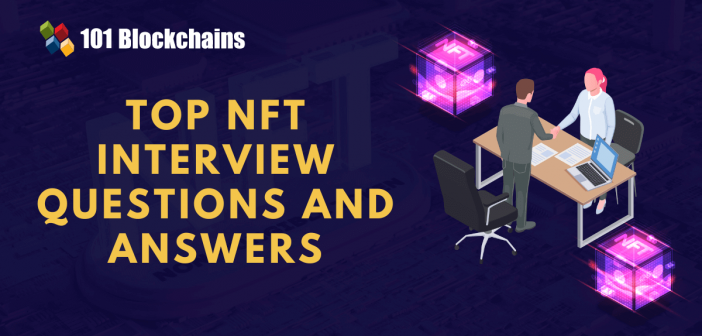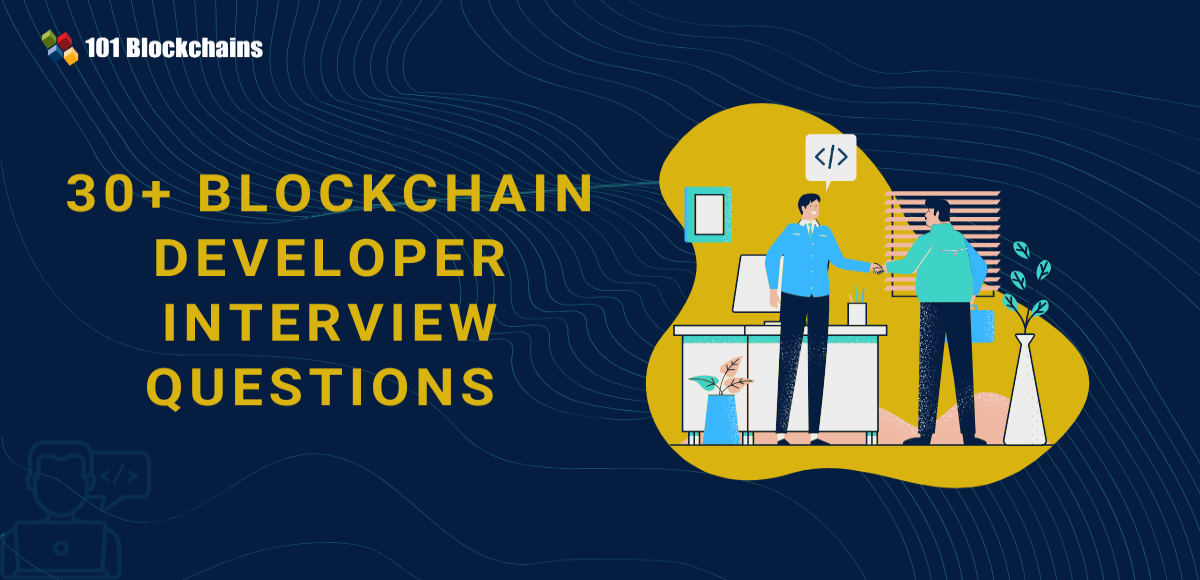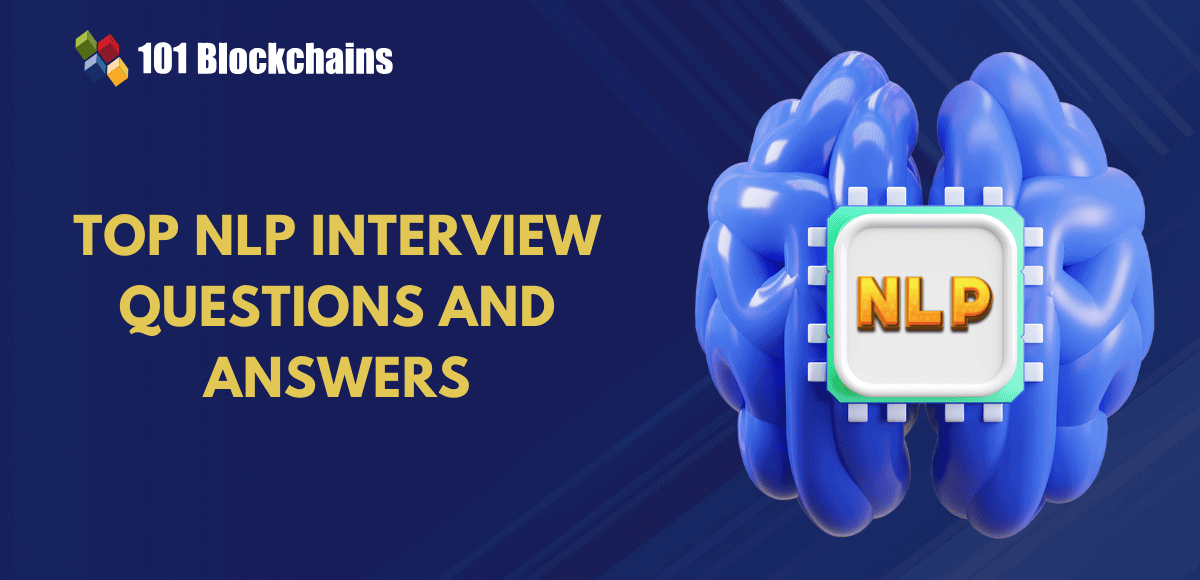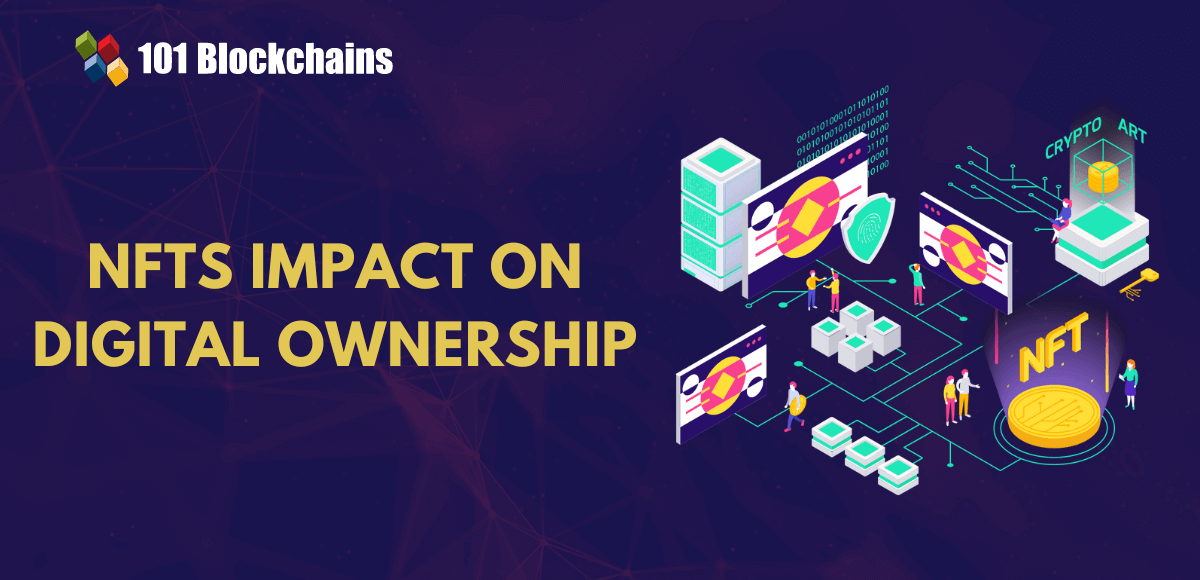Learn how blockchain truly works, master key definitions, and uncover what makes smart contracts so "smart." Dive into the fundamentals, gain valuable insights, and start your blockchain journey today!

- Interview Preparation
Georgia Weston
- on February 28, 2023
Top 20 NFT Interview Questions and Answers
The crypto market witnessed a rough year in 2022 with the radical drop in the value of cryptocurrencies alongside the downfall of leading crypto platforms. Volatility and uncertainty are the inherent traits of the crypto market, and one could expect times to change. One of the significant entities which can drive the expansion of the crypto ecosystem is non-fungible tokens or NFTs. Are you looking for NFT interview questions to prepare for a career in NFTs? Non-fungible tokens have opened up many job prospects for blockchain professionals and non-technical job roles.
While you can rely on professional training courses and certifications for skill development, interview questions play a vital role in career development. Let us learn some of the most important questions you can find in NFT job interviews.
Why Should You Prepare for NFT Interview Questions?
Before you seek the best NFT interview tips, it is important to know why NFTs offer a promising career path. The continuous rise in the number of NFT collections and new marketplaces indicates promising growth in the non-fungible token industry.
On the other hand, the NFT space has also emerged as one of the targets for malicious and fraudulent activity. For example, fake non-fungible token collections have influenced the reputation of the NFT market.
However, innovative developments in the field of digital NFT artwork beyond PFP images alongside utility-based NFTs showcase the positive aspects of the NFT market. Here are some notable statistics which dictate the massive scale of opportunities available in the non-fungible token landscape.
- The amount of total NFT sales reached almost $55.5 billion in 2022.
- Market capitalization of the NFT market reached a peak at $41.5 billion in April 2022.
- As of 2021, the NFT ecosystem had almost 14,500 NFT collections. However, 2022 witnessed exponential growth in the number of NFT collections, with almost 85,000 new collections.
- Solana blockchain introduced around 5,335 NFT protocols in 2022 and garnered the maximum active user base in October 2022 at 411,000.
- The OpenSea NFT marketplace generated more than $903 million with platform fees, which supported the marketplace as well as creators.
- The NFT industry procured investments of around $2.98 billion in 2022.
Want to get an in-depth understanding of non-fungible tokens (NFTs)? Enroll now in NFT Fundamentals Course.
Most Common NFT Interview Questions and Answers
The evolution of NFTs with new utilities alongside innovation in their existing use cases has fuelled the prospects for lucrative NFT careers. However, you must learn the important non-fungible tokens interview questions to ensure that you can answer them with confidence. At the same time, you must also note that interviewers would test your knowledge of NFT fundamentals as well as its technical implications. Let us find out the most popular questions you would find in different categories of NFT job interviews.
Basic NFT Interview Questions
The basic NFT questions help employers evaluate the preparedness of candidates for non-fungible tokens. The fundamental-level questions are essential for testing whether you know what NFTs are and their benefits. Here are some of the common basic questions you can expect for NFT jobs.
1. What is a Non-Fungible Token?
The first thing an interviewer would ask before any other NFT question and answer would be the definition of NFTs. Non-fungible tokens are a unique class of digital assets that are represented on the blockchain. The primary foundations of NFTs present similarities to that of cryptocurrencies, and they are subject to decentralized verification. However, NFTs are unique assets with distinctive metadata and unique smart contracts to distinguish them from each other. The term ‘non-fungible’ provides a clear explanation of why NFTs cannot be traded or exchanged like other blockchain-based assets.
Get familiar with the basic and advanced Non-Fungible Token (NFT) terms with the NFT Flashcards
2. How are NFTs different from cryptocurrencies?
The prominent line of difference between non-fungible tokens and cryptocurrencies is fungibility. You can answer such NFT testing interview questions with examples of cryptocurrencies such as Bitcoin. An individual with 1 BTC can redeem it in fiat currency or exchange it for another BTC without losing value.
However, you cannot exchange an NFT for another, as every non-fungible token has unique traits dictated in smart contracts. Another distinction between NFTs and cryptocurrencies is the focus of cryptocurrencies on economic value. Non-fungible tokens can leverage smart contract programmability for serving different utilities other than digital artwork.
3. What is NFT digital art?
Digital artwork is one of the prominent highlights in the existing NFT landscape. It is one of the primary factors which garnered attention towards NFTs. You can answer such non-fungible tokens questions with an emphasis on how non-fungible tokens revolutionize the value of ownership of the artwork. Non-fungible tokens help introduce the element of scarcity in digital art, thereby increasing their value. NFT digital art has also played a vital role in ensuring that creators can gain viable returns for their artwork.
4. Are NFTs really unique digital assets?
The common NFT interview questions test the knowledge of candidates about the technical foundations of non-fungible tokens. The applications of non-fungible tokens focus on ensuring that digital files cannot be duplicated easily. NFTs are unique and rely on tokenization for a digital or physical asset, which generates a certificate of ownership that you can buy or sell. Just like cryptocurrencies, NFTs can leverage all the benefits of blockchain technology. The ownership of NFTs is immutable, and creators could also use smart contract programmability for receiving shares from secondary sales.
Learn the concept, elements, future and use cases of NFTs from the E-book: Non Fungible Tokens (NFTS) – A Definitive Guide
5. What are the benefits of NFTs?
One of the common queries in NFT job interviews could be “What problems can NFT solve?” and you can point out their benefits. Non-fungible tokens can help in ensuring the security of digital assets and ownership of physical assets. The association of NFTs with blockchain ensures their immutability and decentralized verification for improved security. Non-fungible tokens solve the problems of ownership, as anyone can verify the owner of an NFT with specific identifiers. In addition, NFTs also solve the problems of centralization by ensuring freedom from the control of centralized authorities.
6. What is NFT minting?
Some of the recommended NFT interview tips would also emphasize questions on NFT minting for job interview preparations. NFT minting refers to the process of converting digital files or data into digital assets or crypto collections documented on a blockchain network.
Creators can choose any digital asset for developing NFTs on their choice of the blockchain network. All you need is a digital wallet and an account on an NFT marketplace, followed by the configuration of the sales process. You can leverage flexible steps in the NFT marketplace guide for the tokenization of digital files.
Excited to develop an in-depth understanding of solidity’s best practices and the tools needed for developing and testing an NFT marketplace, Enroll now in the NFT Development Course
7. How are smart contracts useful for NFTs?
Most of the non-fungible tokens questions would emphasize the implications of smart contracts for non-fungible tokens. Smart contracts are automatically executable programming logic that would run upon compliance with specific conditions. Smart contracts also update the relevant changes on the blockchain, thereby ensuring their immutability.
The applications of smart contracts in non-fungible tokens could help in removing the need for trusted centralized intermediaries to validate NFT ownership. A smart contract can also support the automatic execution of NFT transactions apart from proving ownership of non-fungible tokens. Most important of all, smart contracts serve a crucial role in creating sale contracts for facilitating NFT sales.
8. How have NFTs influenced the gaming industry?
The implications of non-fungible tokens in the gaming industry have garnered significant attention in recent times. NFTs can provide unique ownership of in-game assets and experiences without the risks of centralized control. In addition, NFTs also provide the option for accessing new opportunities for monetization in the gaming industry. Some of the popular NFT games include Axie Infinity, Gods Unchained, Sorare, Splinterlands, The Sandbox, and Illuvium.
Start learning Non-Fungible Token with World’s first NFT Skill Path with quality resources tailored by industry experts Now!
9. What is the ideal practice for pricing NFTs?
The list of common non-fungible tokens interview questions also includes queries for testing your knowledge of NFT pricing. The pricing for non-fungible tokens or NFTs depends on the demand and supply dynamics. With multiple copies of the NFT, it would have a lower value. On the other hand, rare items could fetch a higher value. NFT creators can use the fixed price or unlimited auction approaches based on their preferences. Unlimited auction lets creators allow buyers to determine the price of NFTs with different speculations.
10. What do you mean by an NFT drop?
The basic NFT testing interview questions would also emphasize topics such as NFT drops. NFT drops refer to the launch of a non-fungible token and point out the exact date and time of minting the NFT. You can also find the minting price of a specific NFT with the first drop. The recommended practice for NFT drops involves the use of purchase limits applicable to different NFTs you could mint in a specific transaction.
Learn the concept, elements, future and use cases of NFTs from the E-book: Non Fungible Tokens (NFTS) – A Definitive Guide
Advanced NFT Interview Questions
Your preparations for NFT job interviews must also focus on NFT questions based on technical aspects of non-fungible tokens. In addition, employers would also evaluate your industry knowledge with advanced questions. Here is an outline of the expert-level questions you can come across in NFT job interviews.
11. What are the notable challenges in the NFT landscape?
Most of the attention around questions like “What problems can NFT solve?” overshadows the challenges associated with NFTs. First of all, the carbon footprint of NFTs creates prominent concerns for the environment. On the other hand, the decentralized nature of NFTs and lack of regulations has spurred a wide range of fraudulent activities. Furthermore, the speculative nature of the existing NFT market emphasizes the fact that hype for an NFT project determines to price.
12. How can you improve utilities of a non-fungible token?
You can seek multiple approaches for introducing utilities with non-fungible tokens. The advanced NFT question and answer collection for interviews evaluate the oversight of candidates regarding NFTs. Non-fungible tokens can offer different utilities other than converting artwork and collectibles into unique digital assets.
In addition, NFTs can play a crucial role in supply chain tracking applications alongside offering early access to merchandise sales for NFT holders. NFTs can also help in creating exclusive membership NFTs that provide VIP privileges in real-life businesses or NFT communities.
13. What are the best practices for developing an NFT community?
The domain of non-fungible tokens also focuses on different non-technical roles. You can answer such NFT interview questions by pointing out the need to define the audience for your NFT project. The other mandatory practices for creating an NFT community include establishing a vision for your community and selecting appropriate communication channels. Subsequently, creators have to create hype around the project alongside offering the assurance of credibility. The best practices for developing NFT communities also include participation in partnerships and podcasts alongside other NFT projects.
14. How will you market a new NFT collection?
The non-fungible tokens questions on marketing NFT collections test your knowledge of the business-related aspects of non-fungible tokens. NFT creators can market their collections by adding their drop to the NFT calendar. In addition, creators could use their social media channels comprehensively for marketing NFT collections. One of the effective practices for marketing NFT collections is an attractive teaser for the project. Creators can also start a thread for the NFT collection on Reddit or Bitcointalk and Telegram communities.
Watch our on-demand webinar on Demystifying Non-Fungible Tokens (NFTs).
15. Is the EIP-1559 a reliable solution for increasing NFT transactions on Ethereum?
The Ethereum Improvement Proposal 1559 has been introduced for changing the gas fee structure on Ethereum. EIP-1550 introduced a new burn mechanism for improving Ethereum scarcity, which would make ETH deflationary. You can expand on such NFT questions by referring to the limitations of low-value NFTs in using the Ethereum blockchain due to higher transaction fees. With the EIP-1559, the Ethereum blockchain could accommodate low-value NFTs with the value of algorithmic price discovery.
16. Do you know about sleep-minting in NFTs?
Sleepminting is a prominent concern for NFT security, as hackers can customize ERC-721 contracts for minting tokens in other accounts. In the case of NFT marketplaces, the implementation of relevant logic for checking ownership of NFT assets before listing could help in avoiding sleepminting. Buyers can identify sleep-minted NFTs by comparing the NFT sender and mint transaction sender with the correct address of the NFT owner.
Excited to learn the basic and advanced concepts of ethereum technology? Enroll Now in The Complete Ethereum Technology Course
17. What is the guarantee of physical assets staying connected with associated NFTs?
The different non-fungible tokens interview questions for experienced professionals also focus on the tokenization of physical assets. Representation of the ownership of physical assets as NFTs on a blockchain network calls for connecting the NFT to the physical asset. Additional tags and trackers on the physical asset could help in associating them with NFTs. The tags can help in verifying the authenticity of the physical asset through details of the associated NFT.
18. Is it possible to change NFT metadata?
The advanced NFT testing interview questions also test your knowledge of possibilities for modification of NFT metadata. You can change NFT metadata only if you are the owner. In addition, the changes in the NFT would be reflected on the blockchain network and every node which has a copy of the NFT.
19. Are NFTs subject to legal risks?
The legal implications for non-fungible tokens depend on the jurisdiction in which they operate or the type of NFT. In the case of NFTs, which represent securities, the security laws would have a significant influence on the legal implications of non-fungible tokens. On the other hand, property NFTs would be subject to real estate regulations.
20. Do you know some examples of popular brands using NFTs?
The most popular applications of NFTs have been identified in the field of marketing and advertising. Notable brands such as Pizza Hut, Nike, and Taco Bell have ventured into NFT projects to engage with their target audience and product promotion.
Build your identity as a certified blockchain expert with 101 Blockchains’ Blockchain Certifications designed to provide enhanced career prospects.
Final Words
The scope for innovation with NFTs and their economic potential are driving the demand for NFT jobs. At the same time, the skill gap in the NFT talent landscape presents a formidable concern for businesses interested in NFT initiatives. The fluency of a candidate in answering NFT interview questions depends on their efforts in professional training. If you want to build a career in NFTs, you must learn more than just the fundamental traits and benefits of non-fungible tokens. Find the best training courses and certifications for NFT professionals now.
*Disclaimer: The article should not be taken as, and is not intended to provide any investment advice. Claims made in this article do not constitute investment advice and should not be taken as such. 101 Blockchains shall not be responsible for any loss sustained by any person who relies on this article. Do your own research!






